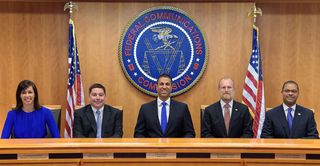FCC Tackles Leased Access

In a unanimous vote, with a couple of partial dissents, the FCC has agreed to tweak and review its rules requiring cable operators to provide channel capacity to independent programmers.

The Commissioners voted at their June 6 monthly meeting to approve a Report and Order (R&O) and Second Further Notice of Proposed Rulemaking (FNPRM) that would vacate the FCC's 2008 leased access rules, adopt new rules that "reflect changes in the video programming market," and seek comment on whether the rules should still be in place at all. The Republican majority that approved the item clearly have their doubts, which could ultimately spell the sunset of the broader leased access regime.
The R&O includes eliminating the requirement that cable operators provide channels for part-time leased access, extending the rule that small systems only have to respond to "bona fide" requests for time (as opposed to requests for information) to all systems, and extend the time frame for responding to such requests from 15 calendar days to 30 calendar days and from 30 to 45 days for smaller systems. Those are all deregulatory changes cable ops have cheered. It also allows for a maximum $100 leased access fee per bona fide request--something NCTA-The Internet & Television Association had sought.
The FNPRM proposes to modify the leased access rate formula so that it is specific to the tier on which it is carried and seek comment on whether "the statutory leased access requirements or the Commission’s other leased-access rules continue to withstand First Amendment scrutiny in light of the market changes discussed in this order?," and, "if not, what discretion does the Commission have to reduce the burdens."
Cable operators with more than 100 channels have to set aside 15% of those channels for leased access, with smaller operators having to provide a smaller percentage.
FCC chair Ajit Pai said leased access has not aged well, calling it the "Betamax" of regulation. "It is long since time to sync our leased access rules with the times," he said. He said he shared the skepticism about the constitutionality of the leased access regime.
Republican commissioner Michael O'Rielly said he was pleased that the FCC item found that OTT was a substitute (for providing access to independent video) and hoped that would inform its media ownership review (Pai said after the meeting not to read anything about his view of the First Amendment impact on leased access regs to his view on his impact on other regulations.). O'Rielly said it was moving the needle in the right direction, but signaled he wasn't sure whether leased access could withstand First Amendment scrutiny in the current competitive marketplace.
Broadcasting & Cable Newsletter
The smarter way to stay on top of broadcasting and cable industry. Sign up below
Fellow Republican commissioner Brendan Carr is also one of those arguing that it appears to be the right time to lift the leased access "burden" entirely, so he also focused on the First Amendment issues on which the FCC is seeking comment.
"The monopoly conditions that courts relied on to uphold leased access and its intrusion on free speech have completely eroded," he said, echoing cable arguments for years. "That’s why last June, when the FCC proposed to modernize our leased access rules, I asked my colleagues to seek comment on the First Amendment implications of our approach. I am glad that we did. '[T]hese First Amendment concerns provide an additional basis for eliminating our part-time leased access rules. So I am glad that we are taking this step today."
Democratic FCC commissioner Geoffrey Starks supported the part-time revision and taking a "fresh look" at the leased access rules, but dissented from the First Amendment part. "I think that the First Amendment analysis offered by the majority goes too far and will put at risk important and well-established cable carriage obligations in other parts of our telecommunications framework," he said.
Democrat Jessica Rosenworcel supported the item, with some reservations, but said the First Amendment language was overbroad and wrong and so dissented from that part. "It is time for a reboot," she said, and supported the effort to do that. But she said she had concerns about how that was proceeding. "We have set the bar high for leased access and we have loaded it down with some new requirements like deposits and full-time channel capacity purchases," she said. "So, going forward, we will need to monitor how this new set of policies work in practice."
"[T]he elimination of the requirement to provide leased access on a part time basis is a giant step backwards for the use of leased access by independent programmers," the Leased Access Programmers Association said of the item.
The Small Business Network had claimed in comments to the FCC that the elimination of the part-time requirement was inconsistent with Congressional intent, but NCTA-the Internet & Television Association, a big backer of the FCC's deregulatory move, had pushed back. "[T]here is no evidence that Congress ever intended cable operators to be in the business of leasing time on a program-by-program basis," it told the FCC in the run-up to the vote. "Instead, Congress required only that cable operators provide an outlet for channels of programming, as is reflected by the plain language of the statute a modest application fee of $100 per system-specific application for leased access."
“Today’s vibrant, hyper-competitive, and increasingly internet-connected video marketplace supports an ever-growing range of pathways for content producers to reach consumers," said NCTA. "But while the marketplace has moved into the 21st Century, the regulatory framework is still a relic of the past. That is why we applaud the Commission’s decision to modernize its leased access rules and to recognize the increased constitutional scrutiny they warrant. We encourage the Commission to continue finding ways to clear away dated regulatory underbrush in today’s dynamic marketplace.”
Contributing editor John Eggerton has been an editor and/or writer on media regulation, legislation and policy for over four decades, including covering the FCC, FTC, Congress, the major media trade associations, and the federal courts. In addition to Multichannel News and Broadcasting + Cable, his work has appeared in Radio World, TV Technology, TV Fax, This Week in Consumer Electronics, Variety and the Encyclopedia Britannica.

